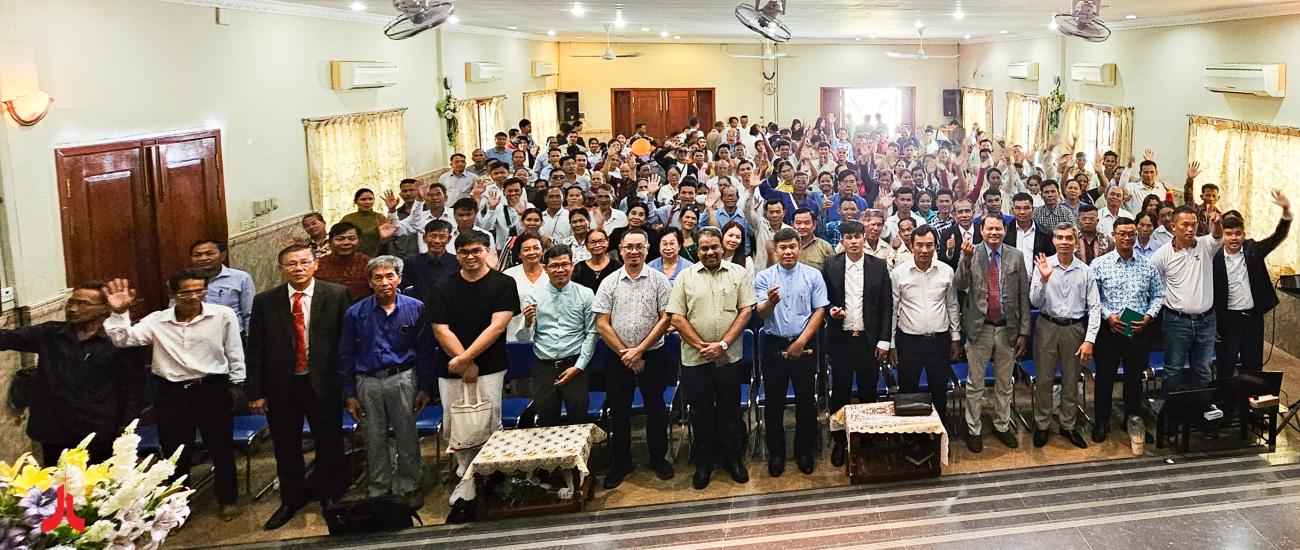Cambodian churches commit to strengthen united witness and missional engagements through the revamped Kampuchea Christian Council

Delegates of the KCC General Assembly
Phnom Penh, Cambodia: The Kampuchea Christian Council (KCC) has entered a new phase in its mission and ecumenical witness. Local church leaders from various provinces of Cambodia who gathered at the General Assembly of KCC affirmed their commitment to strengthen the united witness and missional engagements.
More than 280 representatives from various churches and congregations across Cambodia attended the General Assembly, which was held at the ‘Family of God’s Church’ in Tuol Sangkee Commune, Russey Keo District, Phnom Penh on 18 and 19 November 2024.
The Assembly elected a new leadership team of KCC for the next three years: Kang Phaldaracheat (President), Lim Saroeun and Sok Lay (Vice Presidents), Sok Nev (General Secretary), and Lim Sambo (Treasurer).
Kang Phaldaracheat, the newly elected president, is a theological graduate from the Seminari Theoloji Malaysia (STM) in the 1990s. He was one of the first Cambodian nationals to undergo systematic theological education in the post-Pol Pot era. He was also the first youth secretary of the KCC and subsequently served as a lecturer at the Phnom Penh Bible School.
Sok Nev, the newly elected General Secretary, graduated in theology from McGilvary College of Divinity in Chiang Mai, Thailand. He has been instrumental in assisting KCC with organising programmes and currently serves as a pastor for a local congregation.
Established in 1998, KCC is the first government-recognised national ecumenical organisation in Cambodia, formed after five years of collaborative efforts to unite various churches and para-church organisations.
The Christian Conference of Asia (CCA) and the World Council of Churches (WCC) jointly initiated a programme to accompany the newly established churches in Cambodia, which at the time were isolated and fragmented.
Dr Mathews George Chunakara, General Secretary of CCA, in his address at the opening session of the Assembly, reflected on the ecumenical accompaniment programmes initiated by CCA and WCC in Cambodia since the 1980s. He highlighted how these initiatives ultimately led to the establishment of KCC in 1998.
The CCA General Secretary described the earlier ecumenical initiatives in Cambodia, which were coordinated by WCC. These efforts initially focused on humanitarian aid and rural development, facilitated through a field office set up in Cambodia following a decision by the WCC Central Committee in the early 1980s. This was immediately after the overthrow of the Khmer Rouge regime, led by the brutal Pol Pot, responsible for the infamous Cambodian genocide between 1975 and 1979. The subsequent transition of power was marred by a civil war that lasted until the early 1990s. During this period, WCC played a crucial role in inviting several Western church-related development agencies and diaconal missions to Cambodia, supporting humanitarian and development projects in the war-torn country.
The signing of the Paris Peace Agreements in 1991, which officially ended the Cambodian–Vietnamese War and the Third Indochina War, was a turning point for faith communities in Cambodia. Religious freedom was guaranteed in the new Cambodian constitution adopted in 1993. Following democratic elections, Christian churches began to emerge across the country. However, Cambodia also became a battleground for missionary work, with multiple denominations from overseas planting churches. It was during this period that CCA and WCC initiated ecumenical accompaniment, helping Cambodian churches work together on a united platform.
The ecumenical programme created sectorial platforms for women, youth, and pastors to collaborate, as well as leadership development and theological training for young Christians.
Dr Mathews George Chunakara said that the culmination of various ecumenical initiatives in the 1990s ultimately led to the establishment of a national ecumenical organisation, the ‘Kampuchea Christian Council’ in 1998.
The KCC was admitted as a member of CCA at the CCA General Assembly held in Tomohon, Indonesia, in June 2000. Since then, both CCA and the WCC Asia Desk have provided human and financial resources to support KCC.
However, KCC became defunct for several years due to a lack of integrity in its leadership and instances of corruption among a few leaders, who attempted to misappropriate KCC’s land, which had been gifted to the organisation by CCA through its ecumenical resource-sharing initiatives.
“The General Assembly and the election of new leaders of KCC have opened a new opportunity for Cambodian churches to work together through a revamped national ecumenical council, KCC, which will help churches across Cambodia,” stated Kang Phaldaracheat, the newly elected president of KCC at the closing session of the Assembly.
The General Assembly also elected convenors of various programme areas, including women, youth, mission, and leadership training.
A five-member Advisory Council was named by the General Assembly, comprising senior members who had previously served in the leadership of KCC and Cambodian churches.










